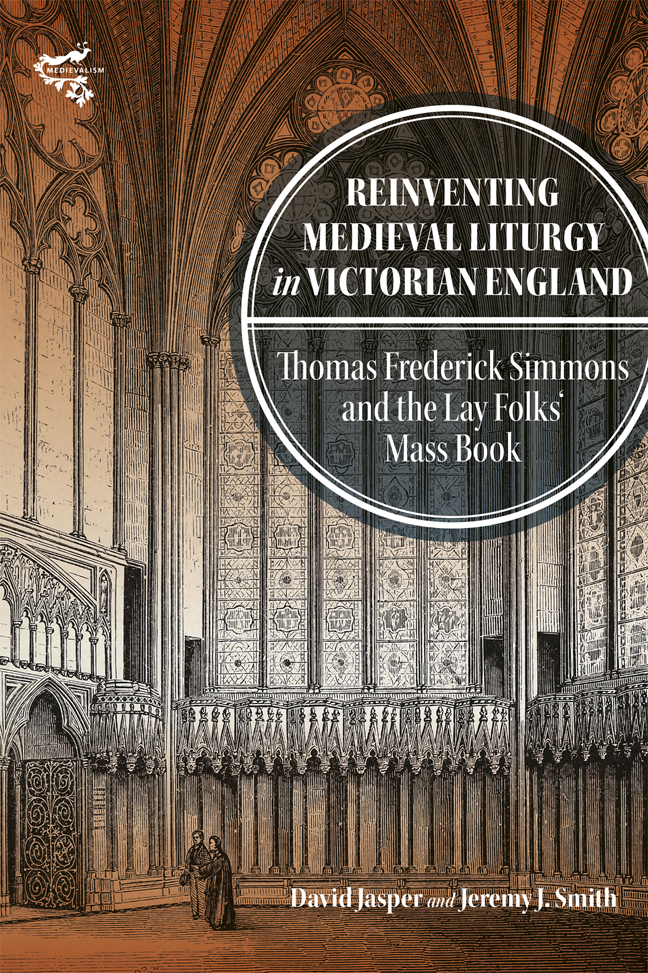 Reinventing Medieval Liturgy in Victorian England
Reinventing Medieval Liturgy in Victorian England Book contents
- Frontmatter
- Dedication
- Contents
- List of Plates
- Preface
- A note on citations
- List of abbreviations
- Introduction: Imagining the Past
- 1 Thomas Frederick Simmons and The Lay Folks’ Mass Book
- 2 Re-imagining Medieval Devotion: Nineteenth-Century Conceptions of the English Church
- 3 Simmons and the Early English Text Society
- 4 Simmons as Editor: The Philologist
- 5 Simmons as Editor: The Liturgist
- 6 Simmons as Parish Priest, and Liturgical Reform in the Victorian Church of England
- 7 The Afterlives of The Lay Folks’ Mass Book
- Conclusion: Liturgical Moments in Time
- Plates
- Appendix I The Lay Folks’ Mass Book: Text and Translation
- Appendix II The Lay Folks’ Mass Book and the Sarum Rite
- Bibliography
- Index
- Miscellaneous Endmatter
Appendix I - The Lay Folks’ Mass Book: Text and Translation
Published online by Cambridge University Press: 02 March 2024
- Frontmatter
- Dedication
- Contents
- List of Plates
- Preface
- A note on citations
- List of abbreviations
- Introduction: Imagining the Past
- 1 Thomas Frederick Simmons and The Lay Folks’ Mass Book
- 2 Re-imagining Medieval Devotion: Nineteenth-Century Conceptions of the English Church
- 3 Simmons and the Early English Text Society
- 4 Simmons as Editor: The Philologist
- 5 Simmons as Editor: The Liturgist
- 6 Simmons as Parish Priest, and Liturgical Reform in the Victorian Church of England
- 7 The Afterlives of The Lay Folks’ Mass Book
- Conclusion: Liturgical Moments in Time
- Plates
- Appendix I The Lay Folks’ Mass Book: Text and Translation
- Appendix II The Lay Folks’ Mass Book and the Sarum Rite
- Bibliography
- Index
- Miscellaneous Endmatter
Summary
This Appendix Offers a new edition, and translation, of LFMB as it appears in London, British Library, MS Royal 17.B.xvii, folios 3r-13r, i.e. witness B in Simmons’ edition. Readers wishing to compare the readings and layout adopted in Simmons’ edition – which is generally cited in the body of this book, thus acknowledging its achievement – can find it online at https://archive.org/details/layfolksmassbook00simmuoft, last accessed 30 August 2022. For further details of all witnesses for LFMB, and full discussion with references, see Jeremy J. Smith, ‘The manuscripts of the Middle English Lay Folks’ Mass Book in context’, Studia Anglica Posnaniensia 56 (2021), pp. 361–85.
This version of the text was also re-edited by Carl Horstman, Yorkshire Writers: Richard Rolle of Hampole and his Followers (London, 1896), volume 2, pp. 3–8, with slightly different punctuation and lineation, and one significant difference in layout (see note to line 432). Horstman also edited other texts from the same manuscript. His commentary on LFMB is restricted to some minor marginal notes, and a few emendations of accidentals; his substantive emendations are almost all derived from Simmons. He also made an attempt, not generally accepted, to assign the poem to Rolle’s authorship, on the basis of the quotation from The Form of Living, and of his view that ‘the contents have a close relation to R. Rolle and his favourite themes … very likely he is the author of most [of the pieces in the manuscript]’ (p. 1).
As indicated in chapter 1, the B-version of LFMB, along with the E-version2, offers the most complete witness for the poem. B seems to be in addition the oldest of all versions, surviving in a manuscript copied at the end of the fourteenth century, according to the British Library catalogue (Simmons dates the manuscript to c.1360, which seems a little early). The manuscript containing B is a miscellany, described in the British Library catalogue as ‘theological works in prose and verse, chiefly in northern English’. LFMB is the first item in the manuscript, and is followed by a pair of lyrics (also found in the Vernon Manuscript), and then by the religious poem Speculum Guy of Warwick.
- Type
- Chapter
- Information
- Reinventing Medieval Liturgy in Victorian EnglandThomas Frederick Simmons and The 'Lay Folks' Mass Book', pp. 181 - 220Publisher: Boydell & BrewerPrint publication year: 2023


